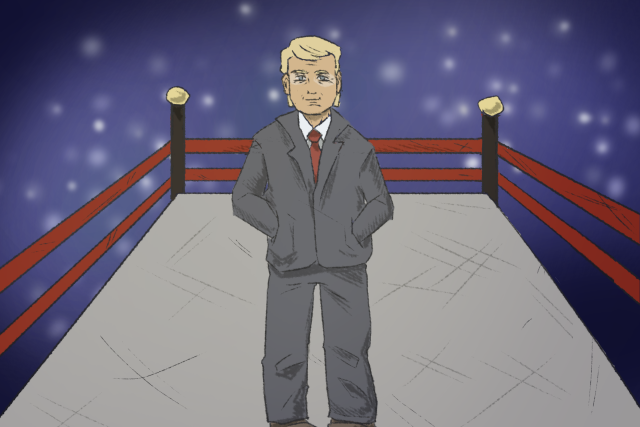[ad_1]
I don’t watch much professional wrestling, but I know a “heel” when I see one.
In the world of professional wrestling, a heel refers to the villain in a given match. They are the fight’s antagonists who rile up the audience in jeers as they hastily wait for their destruction, only for the crowd to find that they’ll live to fight another day. They’ll cheat to win and bask in the audience’s boos as they do. Heels are the fighters that people love to hate.
Heels can also exist outside of wrestling — and few match this persona quite like former President Donald Trump. Ever since riding down his golden escalator in 2015, the billionaire has become a figure synonymous with a new era of conservative politics in the United States. His rise to political prominence has been unlike any other. And while most would be quick to call Trump an evil, corrupt politician, his status as a rogue figure has paved the way for his supporters to view him as an antagonist to what they see as a corrupt establishment. This status as the “world’s heel” has become intrinsic to his campaign and has only helped him amass a loyal tribe of supporters willing to die for him. This fanbase supports the former president at his every whim, and with four years on the line this November, his vengeful campaign to return to office might be characteristic of his potential presidency.
The popular culture’s resentment for the former president began before he did. In 2008, “The Apprentice” star was embroiled in controversy as he infamously doubted the citizenship of then-Democratic presidential nominee Barack Obama. The attack, seen by many as racist, was the first of Trump’s ridiculous antics to receive negative press coverage.
The animosity between Trump and the mainstream media has only grown as the former president has continued to step in and out of drama, whether it be for a long history of insensitive remarks or a presidency plagued by scandal. Not only is Trump the only president to ever be impeached twice, but he also made history by being the first former president to become a convicted felon, having been charged with 34 felony counts earlier this year.
However, all of this justifiably negative coverage hasn’t resulted in Trump being shunned from the entirety of the public eye — only half of it. Trump and his supporters have only been emboldened by his opposition to the “mainstream media,” an opposition fueled by the constant criticism he receives from them. His rivalry with the media, as well as his various legal woes, has given many Republicans the impression that Trump is an enemy of the elites that run the government and media. He is, to them, a tried and true man of the people. Trump has constantly described himself as an outcast of the elite and an insider who was rejected for standing against corruption. His violent opposition to the press, his disrespect for other politicians and his neglect of the customs and traditions associated with the presidency are all parts of his brand as the establishment’s villain.
Ironically, this laundry list of transgressions is the same reason why so many Democratic voters have an unusually large amount of disdain for the former president. But Trump supporters, who are fueled by what they think is a systematic hatred of the former president, see the reaction Trump receives as proof that he is an outsider in Washington, D.C., and an enemy of the “corrupt elite,” This means that for every criminal charge, election poll or scathing article, a Trump supporter sees another reason to believe that the system is rigged against them, and therefore another motivation to vote for the “villain” of the mainstream.
To his supporters, Trump is about as much a heel as any other wrestler: vengeful, merciless and willing to skirt the rules for victory. And they like it.
Any time that Trump’s loyal fans see him down in the polls or attacked in the news, they are encouraged to believe that they are fighting for him, opening the door for violence and aggression in his name.
This, of course, is what led to the events of Jan. 6, in which thousands of disgruntled Trump supporters rioted in the U.S. Capitol to prevent former Vice President Mike Pence from certifying what they believed to be a stolen election.
Once again, Trump convinced his supporters that he was a victim of a corrupt system, one that was willing to cheat to keep him from the presidency. And now, as the former president lives despite two assassination attempts, his supporters continue to rally under the impression that he is a part of a new counterculture, who is fighting for retribution.
This vengeful rhetoric, contextualized by the events of Jan. 6, elicits a violent and aggressive picture of revenge against those who have doubted and stood in his way before. And with an election on the horizon, it might serve us to remember the extent to which Trump’s fans are willing to go in the name of retribution.
Donald Trump is now 78 years old, and probably couldn’t complete a WWE knockout quite like he used to. However, he is still as much a heel as he has ever been, and as long as people boo him and the media thrashes him, he and his supporters will continue to feel vindicated in their dash for revenge.
Mateo Alvarez is an Opinion Columnist studying political science. His column, “Byte the Ballot”, discusses the ways in which politics tangle with digital culture. He can be reached at mateoalv@umich.edu.
Related articles
[ad_2]
Source link











